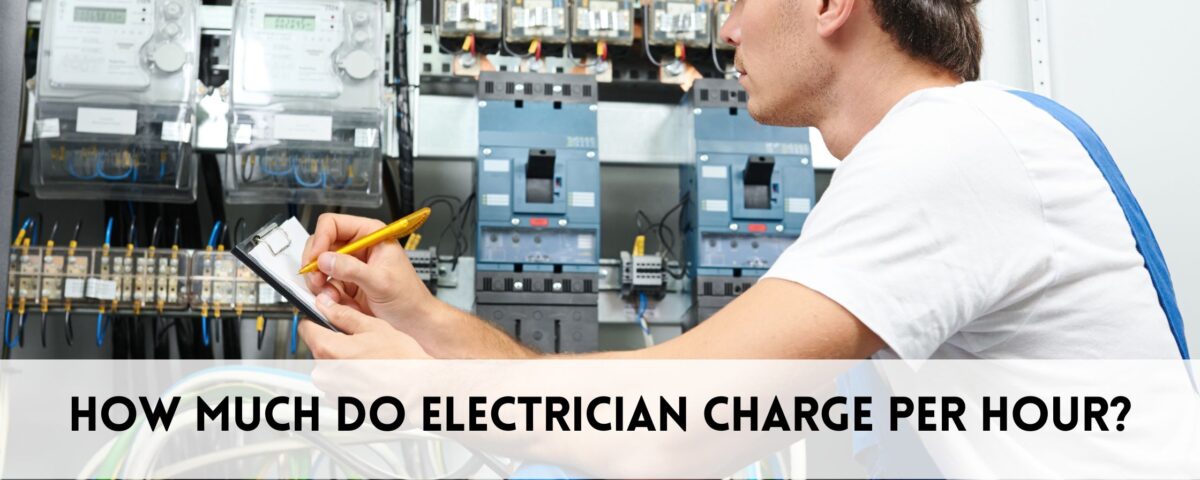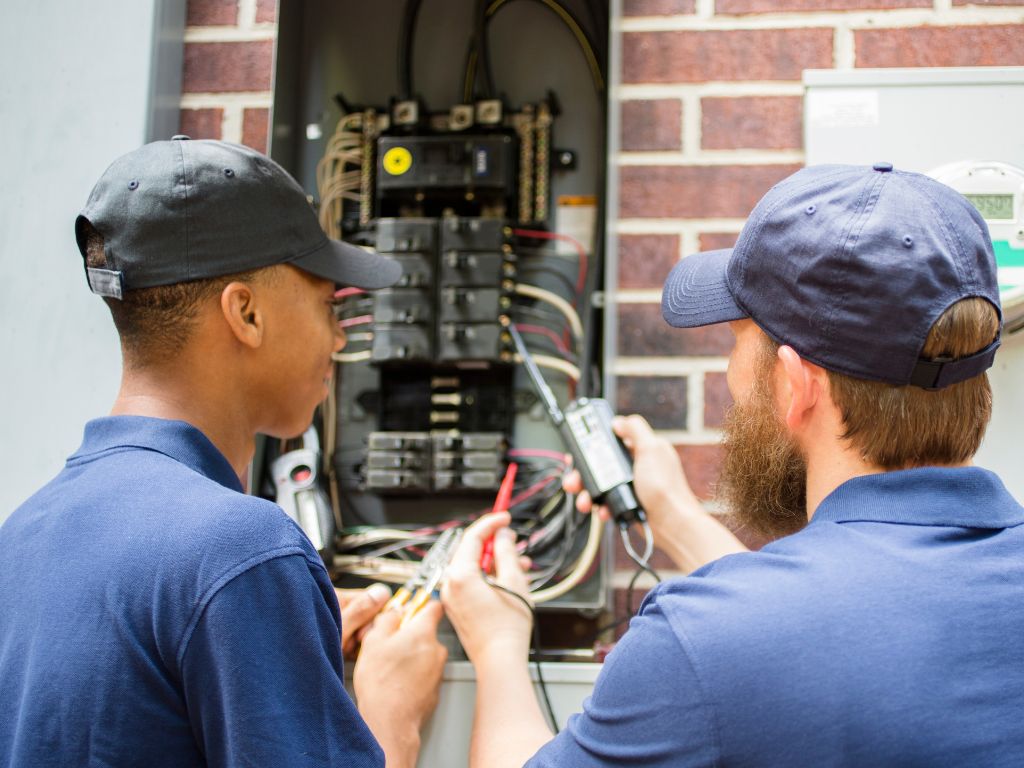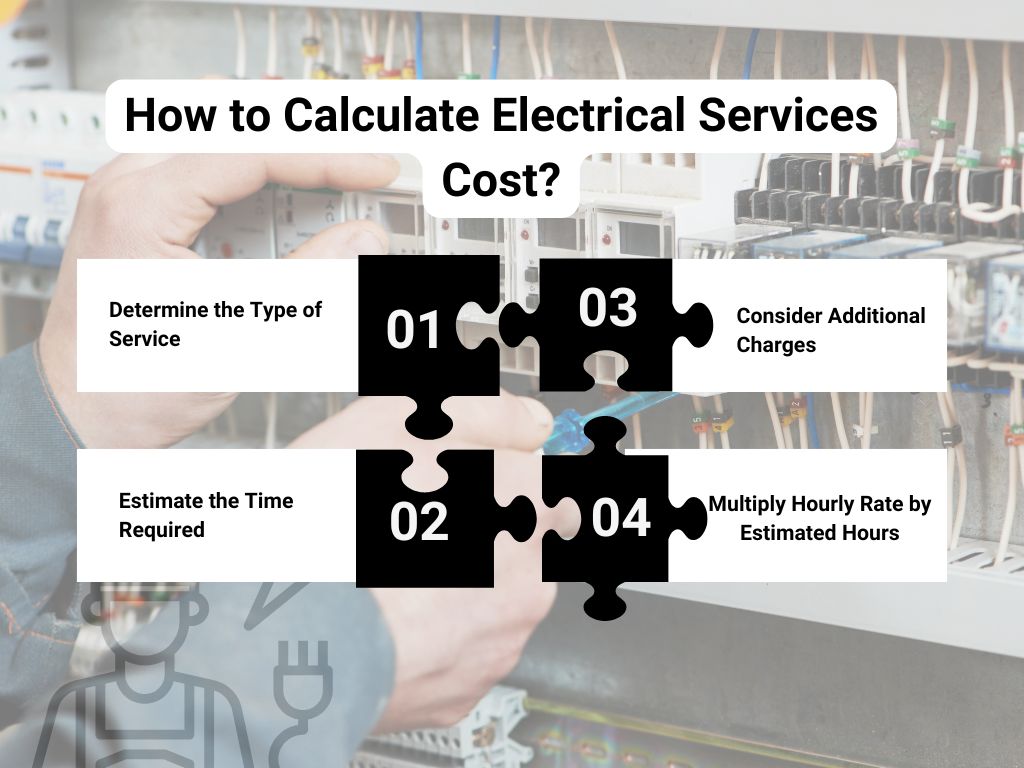
How much underground power line cost per foot?
April 3, 2025
Do you need an electrician to install a ceiling fan?
April 25, 2025Understanding the cost of hiring an electrician is crucial for homeowners and business owners alike. One of the most common questions when considering electrical services is, How much do electricians charge per hour? Electrical work, whether for simple repairs, installations, or larger projects, can be expensive, and having a clear understanding of typical electrician hourly rates helps in planning and avoiding unexpected costs.
Electrician rates can vary significantly depending on the complexity of the job, the level of expertise required, and the project’s location. In San Jose, CA, for instance, the average electrician’s hourly rate ranges from $50 to $100 per hour, depending on the type of service and whether it’s an emergency call.
By being informed about the typical electrician charges in your area, you can ensure you’re hiring a professional who provides both quality and value. This guide will break down the factors influencing electrician rates, helping you decide when hiring a skilled electrician for your next project.
How much do electrician charge per hour?
The hourly rate for electricians can vary significantly depending on several factors such as location, the complexity of the work, and the experience of the electrician. To give you a clear understanding of the expected costs, here’s a unique table breaking down the average electrician charges per hour based on the type of service you require.
| Service Type | Hourly Rate | Description |
| Basic Electrical Repairs | $50 – $120 | Includes fixing outlets, light switches, or minor wiring issues. |
| Electrical Installations | $50 – $100 | Wiring for appliances, light fixtures, ceiling fans, or outlets. |
| Rewiring and Major Projects | $50 – $150 | Large-scale rewiring or electrical system upgrades for homes or businesses. |
| Emergency Electrical Services | $100 – $200 | After-hours, weekends, or urgent electrical repairs. |
| Electrical Consultation | $50 – $100 | Initial consultation to assess the electrical needs of your home or business. |
Basic Electrical Repairs
This service typically involves fixing minor issues such as faulty outlets, light switches, or wiring problems in a home or business. Common tasks include replacing damaged sockets, repairing malfunctioning switches, or ensuring that electrical connections are functioning properly. Basic electrical repairs are usually straightforward and quick, requiring less time compared to complex installations or rewiring. Since they are relatively simple tasks, the cost for this service tends to be more affordable. However, even minor electrical issues should be addressed promptly to avoid potential safety hazards like electrical fires.
Electrical Installations
Electrical installation services encompass the wiring of new appliances, light fixtures, ceiling fans, outlets, and other electrical components. This service is essential for home improvement projects, new constructions, or upgrading electrical systems. Installations require a deeper level of expertise to ensure that wiring is done correctly and safely. Proper installation is crucial for preventing electrical faults and maintaining the overall functionality of the electrical system. Tasks can range from simple appliance installations to more complex lighting setups, requiring a professional electrician to ensure everything meets local safety codes and standards.
Rewiring and Major Projects
Rewiring a house and major electrical projects involve substantial work, such as upgrading an electrical system or completely rewiring a home or business. This service is typically necessary when older buildings have outdated wiring, or when significant electrical improvements are needed to accommodate new systems or appliances. Rewiring ensures that a property’s electrical infrastructure can handle the power demands of modern technology, enhancing both safety and efficiency. These projects often require detailed planning and considerable time, as well as compliance with local electrical codes and regulations. Due to the scale and complexity, this service is generally more expensive than standard repairs or installations.
Emergency Electrical Services
Emergency electrical services are typically required after-hours or on weekends when urgent electrical issues arise. These issues may include electrical outages, power surges, or dangerous wiring problems that need immediate attention to prevent further damage or safety risks. Emergency electricians are available 24/7 and are trained to handle high-priority situations with minimal disruption. Because these services are offered outside of regular working hours, they often come with higher costs. Timely response is crucial in emergencies to restore power and avoid potential fire hazards or electrocution risks, making emergency electrical services indispensable in critical situations.
Electrical Consultation
An electrical consultation service involves an expert assessment of your home or business’s electrical system. This may include an evaluation of current wiring, identifying potential safety hazards, and providing recommendations for upgrades or repairs. It is often the first step before starting any electrical work, as it helps identify the scope of the project and understand the client’s needs. An electrician may also suggest energy-efficient solutions or ensure that the existing electrical system meets modern standards. This service is ideal for individuals planning renovations, purchasing a new property, or looking to improve the efficiency of their existing electrical systems.
Factors That Influence Electrician Hourly Rates
Several factors play a role in determining how much electricians charge per hour. These include:
Experience & Skill Level
The experience and skill level of an electrician significantly influence the hourly rate. Experienced electricians, especially master electricians, typically charge higher rates due to their specialized training and expertise. A master electrician has typically spent years working in the field, often earning advanced certifications, and can handle complex projects.
This level of experience allows them to deliver quality, reliable work that adheres to the highest standards. As a result, electrician hourly rates for experienced professionals can be much higher, sometimes reaching $150 per hour. While hiring a seasoned professional might cost more upfront, their knowledge and efficiency can save money in the long run by preventing mistakes or future issues with electrical systems.
Location
The geographical location where the electrical services are provided plays a crucial role in determining electrician rates. Areas with higher living costs, like San Jose, CA, typically see higher hourly charges for electricians compared to smaller towns or rural areas. This is because electricians need to account for the cost of living, transportation, and sometimes, higher insurance or licensing fees.
Additionally, urban locations often have greater demand for skilled electricians, which can push prices up due to market conditions. It’s essential to factor in your region when considering electrician charges to ensure that you are budgeting accordingly for any electrical project.
Job Complexity
The complexity of the job is another significant factor in determining electrician hourly rates. For straightforward tasks like fixing a faulty switch or replacing a light bulb, the rate will be relatively low, as the work can be completed quickly and doesn’t require advanced skills.
However, for more complicated projects such as rewiring a house, installing a new electrical panel, or upgrading the entire electrical system, hourly charges can increase substantially. These tasks require more time, effort, and expertise, thus raising the cost. On average, for more complex jobs, electricians in San Jose may charge between $120 and $150 per hour. Understanding this distinction helps in accurately estimating your costs.
Availability
The availability of the electrician, particularly when you need them for emergency services, is an essential factor influencing electrician rates. Emergency services, which are required during weekends, holidays, or after normal working hours, often come with a premium charge.
This is because electricians offering emergency services are available outside regular business hours, and they must be compensated for their time. For urgent situations such as power outages, electrical hazards, or repairs needed right away, the rate can increase to $150 – $200 per hour. It’s crucial to plan for any electrical issues and understand the potential cost if you need services outside typical business hours.
Type of Service
The specific type of electrical service you require will also affect the electrician’s hourly rate. Routine tasks such as general maintenance, troubleshooting, or minor repairs tend to be less expensive, as they require less time and expertise. On the other hand, services like electrical installations, rewiring projects, or panel upgrades typically involve more complex work, specialized knowledge, and longer durations.
These services often come with higher hourly rates due to the additional labor, technical skills, and equipment required. When considering the cost of hiring an electrician, always assess the scope of the project to determine which service type aligns with your needs and budget.
How to Calculate Your Electrical Services Cost: A Step-by-Step Guide
Calculating the cost of electrical services is essential to avoid unexpected expenses and to stay within your budget. Here’s a breakdown of how to effectively calculate the total cost of your electrical service:
Determine the Type of Service
- Identify whether you need a basic repair, electrical installation, or a complex project like rewiring or upgrading an electrical system.
- Simple repairs such as fixing outlets or light switches will usually be more affordable than larger projects.
- Complex projects, like rewiring an entire home or installing new electrical systems, may require more time and specialized skills, impacting the cost.
- Clarify the scope of work with the electrician to ensure an accurate cost estimate.
Estimate the Time Required
- Estimate how long the electrical work will take based on the service type.
- A basic electrical repair may take 1-2 hours, while larger projects such as rewiring could take several days.
- Ask the electrician to provide a time estimate during the consultation. This helps to ensure that both you and the electrician are on the same page regarding expectations.
- Consider the electrician’s availability and potential delays that could extend the project time.
Consider Additional Charges
- Many electricians charge additional fees beyond their hourly rate.
- Flat service fees may apply for travel, administrative costs, or initial assessments.
- Some electricians charge a call-out fee for coming to your location, especially if it’s an emergency or outside regular hours.
- The cost of materials such as wiring, circuit breakers, switches, and other parts will typically be added to the bill.
- Always ask about any additional charges beforehand to avoid unexpected costs at the end of the project.
Multiply Hourly Rate by Estimated Hours
- Multiply the electrician’s hourly rate by the estimated time required for the job to get a rough idea of labor costs.
- For example, if the electrician charges $100 per hour and the work is expected to take 4 hours, the labor cost will be $400.
- Don’t forget to add the cost of materials or additional service fees to the final estimate.
- Always request a detailed, written estimate from the electrician before work begins to avoid any confusion or surprises.
Types of Electricians and Their Charges
Not all electricians charge the same rate. There are different types of electricians based on their skills and the work they specialize in.
| Electrician Type | Hourly Rate |
| Apprentice Electrician | $40 – $60 |
| Journeyman Electrician | $60 – $90 |
| Master Electrician | $90 – $120 |
Apprentice Electrician
An apprentice electrician typically has 1-3 years of hands-on experience in the field and works under the direct supervision of a licensed or more experienced electrician. This position allows them to gain practical knowledge and refine their skills. While apprentices are still learning, they can perform basic tasks such as installing outlets, switches, and performing minor repairs.
However, due to their relatively limited experience, their rates are typically lower compared to more seasoned professionals. It’s important to note that an apprentice electrician will generally require oversight, particularly for more complex tasks. Hiring an apprentice can be cost-effective for simple jobs but may come with a longer time frame.
Journeyman Electrician
A journeyman electrician is a fully qualified professional with at least 3 years of practical experience in the field. Journeymen are capable of handling a wide range of electrical tasks, from wiring homes to troubleshooting and installing systems. They possess a strong understanding of electrical codes, safety regulations, and best practices.
A journeyman electrician can work independently and is typically licensed after completing an apprenticeship and passing exams. Their services are often needed for both residential and commercial projects, offering a balance of skill and experience that makes them a reliable choice for medium-to-complex jobs.
Master Electrician
A master electrician holds the highest level of certification in the electrical field. With years of advanced training and experience, master electricians have a deep understanding of complex electrical systems, including designing, installing, and maintaining high-voltage or industrial systems.
They are skilled in troubleshooting advanced electrical issues, ensuring compliance with local codes, and can take on large-scale projects such as rewiring commercial buildings or overseeing electrical system upgrades. Their expertise is also valuable in providing training to other electricians and managing teams. Master electricians typically charge higher rates due to their extensive knowledge and ability to handle intricate and high-risk electrical work.
Emergency Electrician
An emergency electrician specializes in handling urgent, after-hours electrical issues that require immediate attention. These professionals are available 24/7, often providing services during weekends, holidays, or after business hours.
They are equipped to deal with critical electrical emergencies such as power outages, circuit breaker failures, or wiring issues that pose potential safety hazards. Emergency electricians respond quickly to minimize damage or risk, such as preventing fire hazards caused by faulty wiring. Due to the urgent nature of their work, emergency electricians typically charge a premium rate, reflecting the need for availability outside standard working hours.
Additional Information
- Ensure Licensing and Insurance: Always verify that the electrician is licensed and insured. This protects both you and the electrician, ensuring the job is done to code and minimizing liability risks.
- Request a Written Estimate: Ask for a detailed written estimate that outlines the hourly rates, materials needed, and the expected completion time. This ensures transparency and helps avoid unexpected costs.
- Clarify Hidden Costs: Be aware of potential hidden costs such as travel fees, call-out charges, or other additional charges that may be added to the final bill.
- Flat Rate vs. Hourly Charges: Some electricians offer a flat rate for certain services, which can be more cost-effective for smaller tasks. Confirm if this is an option before proceeding.
- Get Multiple Quotes: Consider obtaining quotes from several electricians to compare rates and services, ensuring you get the best value for your electrical project.
Final Words
The cost of hiring an electrician and How much do electricians charge per hour? depends on several key factors, such as the complexity of the job, the type of service, and your location. Whether you are looking for a simple electrical repair, installation, or a more complex project like rewiring, understanding these factors will help you budget effectively and make an informed decision. It’s essential to get a detailed written estimate and compare prices from multiple electricians to ensure you are receiving fair and competitive rates.
When hiring an electrician in San Jose, CA, always choose a licensed and insured professional to guarantee quality service. By doing so, you can ensure that your electrical work is performed efficiently, safely, and to the highest standards. Don’t hesitate to contact a qualified electrician for accurate quotes and reliable electrical solutions.



